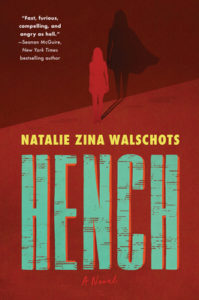
I hadn’t heard much about Hench when it came out, but this is the time of year when an interesting premise and a couple people convinced it should be in consideration for a Hugo nomination is enough to give something a second look. And, while I probably won’t include Hench on my ballot, Natalie Zina Walschots’ debut was a really good read.
Hench follows Anna, a data scientist who makes ends meet by working temp jobs for low-level villains. But after a nasty personal encounter with a hero, she becomes genuinely convinced that superheroes are a net negative for society—the collateral damage vastly outweighs any good that they accomplish. This spurs her further into the world of villainy, where she takes a job constructing underhanded, data-driven assaults designed to emotionally unbalance heroic foes.
Superhero stories have been around awhile, and superhero subversions aren’t exactly new either. After all, “superheroes are bad, actually” storylines can be found in The Incredibles and The Powerpuff Girls, among others. But unlike those stories about heroes fighting public perception, Hench presents a protagonist seeing her life undone by heroic activity, and Walschots ably portrays the physical and emotional distress and the resulting changes to Anna’s life—both chosen and forced upon her.
Anna’s initial run-in with the world-famous hero Supercollider and the turmoil that followed provide a compelling start, but Hench gets even better in the second half as Anna’s personal growth takes her into the orbit of higher-level villains. This simultaneously shows off her character growth, together with its benefits and costs, as well as introducing intriguing new side characters and allowing Anna to take a more active role in the plot. From about 55% on, Hench was very tough to put down.
That momentum continues unabated until the climax, which added a bit of body horror and leaned extremely heavily into superhero tropes. Personally, I found this distracting. Of course, some of it comes down to personal preference, and, as someone who doesn’t read heavily in the superhero genre, I may not be the ideal audience here. That said, Walschots bundled her superhero subversion with some biting social commentary and wrapped both in an independently intriguing story about a compelling character. And as the ending hewed closer to the tropes, the social commentary became more and more on-the-nose and the story a little less immersive.
All told, there’s a lot to like with Hench—it’s an interesting story about an intriguing character with some genre subversion and strong social commentary. But the balance doesn’t come off quite right at the finish, undercutting the five-star potential that had steadily built throughout the second half of the novel and leaving this one merely quite good.
Recommend if you like: superhero subversions, morally gray protagonists.
Overall rating: 15 of Tar Vol’s 20. Four stars on Goodreads.
